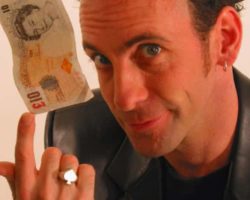
Top Ten Opera Villains
Top Ten Opera Villains
Even those of us that got most of their musical education from Bugs Bunny cartoons know that Operas have a marked tendency to end badly. But few really take the time to admire all the effort that goes into preventing the happy endings: for every soprano and every tenor singing their love duet center-stage, there is a bass-baritone lurking somewhere in the shadows just waiting to turn the music to a minor key, and the amount of plot twists required for him to suceed is simply staggering! So with this in mind, let us pay a homage to the Operatic villain. Let us sit back and count down those top en vocal virtuosoes that were just that good at being bad!
10.The Mikado
from Sullivan’s “The Mikado” (Sullivan as in “Gilbert and Sullivan”)
Timothy Spall as Richard Temple playing the Mikado in the movie Topsy Turvy While some might consider the works of Gilbert and Sullivan as Operettes, or even Musicals, their creators labeled them as “Light Opera”, and in this list we’re sticking to that. Besides, how could we leave out what is probably the most influential duo in English-speaking musical theater?
And from all their works, while HMS Pinafore might be the most iconic and Pirates of Penzance the most popular with modern audiences (with a Broadway adaptation and no less than two movies to its credit), on the long run none has enjoyed a greater sucess, with countless adaptations and enduring popularity as everything from a high school play to a grand opera, than their masterpiece “the Mikado”. And at the center of this bright and sunny black comedy -never has a story who’s main plot points are the threat of mass execution by beheading (for flirting), burying alive and something involving either “boiling oil or melted lead” been so merry and surprisingly clean- stands the ominous, gleefully, almost sarcastically evil figure of the Mikado, the Emperor of Japan. Though he only appears halfway through the second act and he really sings very little except for his own introductory aria (“A more humane Mikado…”), this tyrannic despot’s shadow looms over every single action of the characters, his subjects, from the very start of the Opera. A “peppery potentate” indeed, to quote another Gilbert and Sullivan work!
9.Doctor Bartolo
from Rossini’s “The Barber of Seville”
John del Carlo as the ‘doc (on the right, with the grey wig), plotting with his friend Don Basilio (Christophoros Stamboglis)Doctor Bartolo is here representing the “basso buffo”, or “comic basse” school of operatic villainy. And while he doesn’t sing the most iconic aria in his opera -“Figaro, figaro, figaro…” that ring any bells? It’s from “the Barber of Seville” too, but Figaro, the titular barber sings it-, he is certainly a force to be reconed with.
To put it simply, Bartolo’s an old coot that wants to marry his teenage ward; his main gimmick is that he’s old. He spends most of his time plotting, performing slapstick comedy and singing patter songs or (parodies of the type of) songs that were cool “in his day” -take note people: this guy is gonna sing stuff that was already outdated when Operas were still being written-. Also, he never performs or even mentions anything even remotely resembling medicine.
Now in his original incarnation Bartolo is more of a buffoon than anything else, but directors nowadays tend to downplay the more farcical elements in this play, so you’ll probably see a more low-key sort of comedy -though they’ll always go for the cheap laugh of having him have a fake heart attack during one of the fast segments-. This can have adverse effects: for one thing, you might end up feeling sorry all him. When you take out the “crazy old man” jokes, he’s really just some poor guy that’s in love with a younger woman…and that gets his house wrecked continually by a protagonist that’s a bit of a jerk like that. However, when done correctly, playing him straight -or at least as straight as he can be played, this IS a comedy after all-, can make this guy come off as the meanest, nastiest but also funniest old bastard this side of the Guadalquivir.
8.Giorgio Germont
from Verdi’s “La Traviata”
Just a sweet old man looking out for his family… (Richard Lewis as Giorgio Germont)This one is another strange pick. Strange in that he’s not really evil. If anything, he’s a good guy! He’s the lead tenor Alfredo Germont’s father and when he isn’t singing touching songs about the beauties of his Mediterranean homeland (“Di Provenza il Mar i Sol”), he’s heaping blessings upon the lead soprano. So why is Giorgio Germont a villain?
Well, basically, because he causes most of the trouble in the Opera. To give a brief synopsis of the plot, the protagonist (Violetta, the titular “Traviata”), is having an illicit relationship with Alfredo. But this is ruining the Germont family’s reputation, so much that Alfredo’s sister (Giorgio’s daughter) is being threatened to have her engagement broken off. And so Giorgio does what he thinks is best for his family, and tries to break up Alfredo and Violetta. And even then, he doesn’t really plot it: he just goes to Violetta and begs her to abandon Alfredo… and not tell him why.
We don’t want to give away the ending, but this has tragic consequences for everyone involved. And all he really wanted was to take care of his daughter… not to mention that he even tries to fix things later on, but to very little avail.
So, ladies and gentlemen, our number eight is Giorgo Germont: the living, singing proof that the road to hell is paved with good intentions.
7.Nero and Poppea
from Monteverdi’s “L’Incoronazione di Poppea”
Rachel Yakkar and Eric Tappy as Poppea and Nerone (Nero) respectively… you should be able to tell which is which on your own, despite the clothesThis opera is outstandingly old, at least a good one or two hundred years older than most of the operas on this list. It was written by Claudio Monteverdi, the father of Opera (though this wasn’t his first work in the genre), but apart from old, it’s also very strange. That is, the flashy ancient Roman setting is fairly common in opera, but the theme is very unique in any medium.
Basically, “l’Incoronazione” presents the triumph of love (classic enough), but in a negative light. In this opera Love triumphs -literally: there is an allegorical prologue, and our familiar Cupid even makes a few appearances during the action-, but he triumphs over Fortune and Virtue.
Now, for anyone familiar with Roman history, Emperor Nero was a deranged psychopath that happened to ascend to the throne of the most powerful empire in the world, making him one of the most vicious, murderous despots in history. Poppea, for her part, was his concubine who, through machinations and seductiveness, managed to claim her place on the throne next to him -though later on even her charms did not spare her from his wrath.
In the opera, Nero loves Poppea. But their love leads Nero to exile the legitimate empress Ottavia, have his tutor the philosopher Seneca killed and coerce the Senate of Rome to crown Poppea empress, while Poppea for her part ruthlessly abandons her lover Ottone as well as any pretense of shame. And when this couple from hell has finished off all the decent characters in the play, after a triumphant, bombastic finale that seems to mock the usual “happy ending” motif, they sing one of the most langorous, beautiful love duets in Opera history (“Pur ti miro”). It has been said about this opera that “Never has the triumph of evil been set to such divine music”.
6.Canio
from Leoncavallo’s “Pagliacci”
Enrico Caruso as Sideshow Bob… uh… we mean CanioIt’s exactly what it looks like: the number six opera villain of all time is a killer clown. The signature role of the legendary Erico Caruso, boasting the famous aria “Vesti la Giubba”, Canio, the leader of a troupe of Commedia dell’Arte clowns, is out to seek revenge on his wife Nedda for cheating on him. His plot is to kill her on stage, before an applauding audience that will realise only too late that the murder is real and not a part of the show… a grisly story indeed. Illustrating the maddening internal strife between love and hatred as well as the strange, almost post-modern conflict between an actor and his stage persona, the character is very complex and human, but also threatening and villainous enough to easily make this list.
5.Carmen
from Bizet’s “Carmen”
Well, I’d trust her…Set in Seville, Spain, but nothing at all like the “Barber”, “Carmen” is a riveting take of passion, jealousy and revenge. And at the center of it all is the eponymous “femme fatale”, who might just as well be a villain or a heroine: José, a soldier of the guard, falls in madly in love with her, and his unbridled passion drives him to unimaginable extents, while her fickleness in toying with him ultimately leads to the breathtaking showdown where… well, we’re not going to give away the ending here, are we? But it is sufficient to say that while some people consider the finale of this opera to be a tragic and sordid crime, others would say that a certain someone gets their comeuppeance.
Plus, while for the most part Bizet is a rather obscure composer, “Carmen” probably has some of the most recognizeable melodies in operatic history, from the Overture to the “Toréador” aria (“Votre toast…”; can you get any more Spanish?), without forgetting, of course, Carmen’s famous Habanera (“l’amour est un oiseau rebelle… l’amour est enfant de Bohème”).
4.Turandot
from Puccini’s… well, “Turandot”
Turandot from an early poster…We think she wants to kill someone but is too bored to do soThis lady is very pretty; fair enough. She’s also the daughter of the Chinese Emperor; so far so good. And, in her search for a husbant, she asks every one of her suitors to answer three questions. If they can answer, she marries them; if they fail she beheads them…. wait, what?
This lead lady, whom we think might be a distant and better-looking relative of n.10, is a cruel despot, cold, ruthless and incredibly powerful with an added bonus of legendary beauty. Standing at the center of a magnificent orientalist superproduction, she is the cause of as much misery and sorrow as anyone else on this list -just ask any of the princes that tried to marry her, or the slave girl Liu, who morally should probably be the protagonist- and despite a bit of a moral turn towards the end, she rightfully takes her spot as the number four best (worst) operatic villain.
3.Don Giovanni
from Mozart’s “Don Giovanni”; wow… people with their names in Opera titles are nasty!
Ruggiero Raimondi as the Don. That face either means he wants to sleep with you or kill you. Either way, run!Don Giovanni is Italian for “Don Juan”. Yes, THE Don Juan. This heartless libertine lies, cheats, kills men, “seduces” women and gets away scott-free for the most part. Not only that, but he stands by his actions unrepentantly, and at one point even goes so far as to invite the ghost of one of his victims to a banquet. When the ghost actually shows up, things start to get truly sinister.
And, without giving away the ending, we will just say that a wish for this character to “go to hell” might be granted more literally than anyone in the audience would expect… and with good reason! Why else would he make number three on the list?
2.The Queen of the Night
from Mozart’s “the Magic Flute”
Diana Damrau (as the Queen of the Night) upon hearing she didn’t make number one… someone is very, very dead!You can’t go wrong with a name like this! In addition to one of the most impressively difficult and recognisable arias in operatic history (“Der Hölle Rach”), this woman has everything a high-fantasy villain like her should have: evil minions, awesome magic powers -even though she uses them in a way that’s so plot-convenient it would be egregious if we didn’t have Mozart’s music to distract us from it- and some of the best costuming and special effects an Opera star could wish for… and that’s saying a lot.
And if it is questionable whether she’s even a villain -she does really, really want to have this one guy dead, but she is also originally presented as a good guy, and her minions save the lead tenor’s life before arming him to go on a quest to save the Princess (the Queen’s daughter). Whether you should take the Opera’s word that she’s actually evil or conclude that she’s just a poor old widow who had her daughter and the guy she sent to rescue her abducted and brainwashed into double crossing her by a cult of wannabe freemasons is anyone’s guess, but all that just makes the Queen of the Night an even more compelling antagonist and interesting character
And what she lacks in the outright detestability of some of the other contestants she makes up for in good old fashioned villainous style!
1.The Duke of Mantua
from Verdi’s “Rigoletto”
Luciano Pavarotti as the Duke… what a jerk! (the Duke, not Pavarotti… Pavarotti’s awesome)See that grin? That’s the grin that says “I’m gonna sleep with your daughter and kill you if you say anything, and you can’t do one thing about it because I’m the Duke!”. This guy is so evil that they had to have the libretto re-written: in the original play on which the opera was based, he was a King, but they had to make him a Duke because it was considered disrespectuful to portray the king as suck a jerk!
The Duke of Mantua (no name given) is a philanderer that goes around holding wild parties and “seducing” his subjects’ wives -he has a wife himself too, but she barely appears-, while he also makes a hobby out of publicly mocking the cuckolds. The opera’s plot thickens when the angelic daughter of Rigoletto, the Duke’s jester falls in love with the Duke (go figure…). Nothing good can come of this, and by the end of the opera you’ll be wishing someone shoots this guy really bad.
The Duke, then, is something of an antithesis for number one on this list: he’s the lead tenor, he’s the main love interest and (by the way) he has one of the most famous arias in opera history (“La Donna e Mobile”)… but he is definitely, definitely villain material!
Honorable Mention: der Erlkoning
from Schubert’s “Der Erlkonig”
The big white ghost… yeah… he’s evilOk, ok, so “Der Erlkonig” isn’t even an Opera. Heck, it’s not even a musical! It’s basically just a lieder, which is classical music lingo for “German Art Song”; the whole thing only lasts about five minutes, and there’s just one singer and one piano involved; considering the huge budgets some of the other productions on this list require, that’s pretty impressive.
The title character, the “Elven King” -or “Alder King”, but that’s not nearly as threatening- is a ghost from the times when elves were actually evil spirits, and their “mysterious trickster” demeanor was the “carry off your kid in the middle of the night” kind of trick. And this is exactly what this creep, who’s set his mind of carrying off some kid who’s riding through the forest with his father in the middle of the night, is up to. What he wants to do to the kid exactly isn’t made clear, but for the sake of keeping this article appropriate, we’ll assume that when he’s talking about how pretty the boy is, he just wants to eat him. Add to that that only the boy can see him, and top it all off with Schubert’s music, and… yeah.




